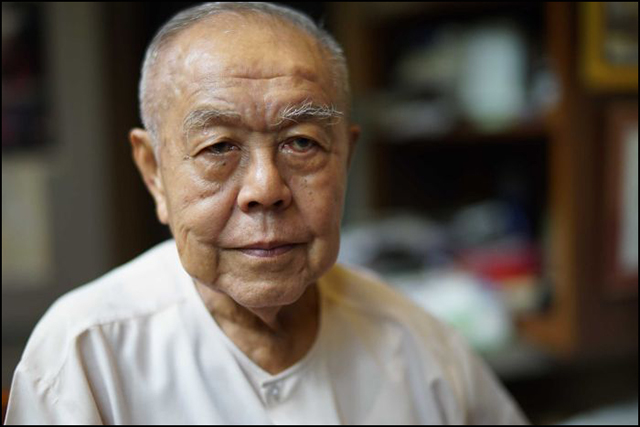
Sulak Sivaraksa is a Thai social activist and founder of the International Network of Engaged Buddhists. His ideas about how Buddhist insight and practice can form the basis for a renewal of society are summed-up in the quotes below. Sivaraksa advocates, not a utopian return to an agrarian subsistence past, but a careful analysis of our current economic, social and political systems – in order to revitalise our ethics and to work towards a more balanced, fair, sustainable society, grounded in mindful action, compassion and responsibility.
S: ‘According to Buddhism, there are three poisons: greed, hatred, and delusion. All three are manifestations of unhappiness, and the presence of any one breeds more of the same. Capitalism and consumerism are driven by these three poisons.’
S: ‘Our greed is cultivated from a young age. We are told that our desires will be satisfied by buying things, but, of course, consuming one thing arouses us to want more. [….] In a capitalistic system, the mass media stimulate desires for things that are not really needed [this is a] deception that plays on people’s greed [and is] difficult to perceive.’ ‘We believe that consuming more, going faster, and living in greater convenience will bring happiness. We don’t look at the tremendous cost to ourselves, to our environment…’
S: ‘Capitalism aims for profit, not for the welfare of the general public.’
S: ‘As long as development is measured in terms of material success, greed will create tension and conflict, and people will increasingly take advantage of, and oppress, one another for a materialistic payoff. If consumers would be more temperate in their desires [….] destructive systems of development and capitalism would fail.’
S: ‘Consumerism supports those who have economic and political powers by rewarding their hatred, aggression and anger. And consumerism works hand in hand with the modern educational system to encourage cleverness without wisdom. We create delusion in ourselves and call it knowledge.’
S: ‘For a Buddhist, being in touch with truth is being grounded in a deep, critical doubt about all beliefs and prejudices. Having seen, through the practice of meditation, the arising of illusion within oneself, one holds all views more loosely. Wisdom can only be achieved through the free and open exercise of the critical intellect.’
S: ‘…two realisations are necessary: an inner realisation concerning greed, hatred and delusion, and an outer realisation concerning the impact these tendencies have on society and the planet.’
In a finite world with limited resources, infinite insatiable desire and consumption, will inevitably be destructive of ourselves, of other beings and of the world we inhabit. Somehow the delusion of unlimited consumption has to be clearly acknowledged and replaced by an ethics of moderation, sustainability, responsibility, and care for the planet and all its interdependent inhabitants.
Bibiography
Sulak Sivaraksa, Seeds of Peace: A Buddhist Vision for Renewing Society, Parallax Press, 1992
